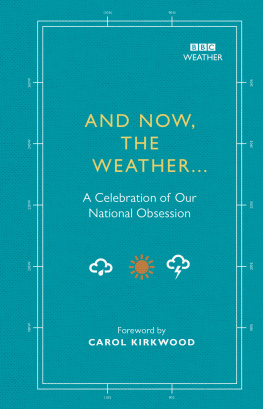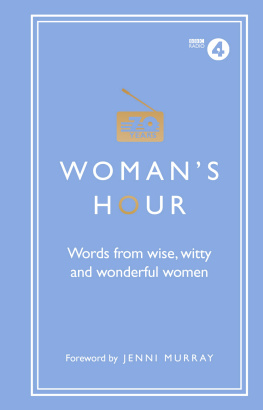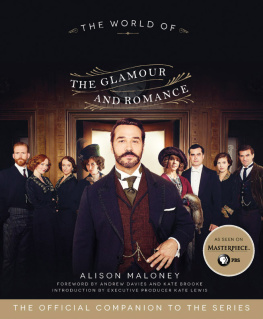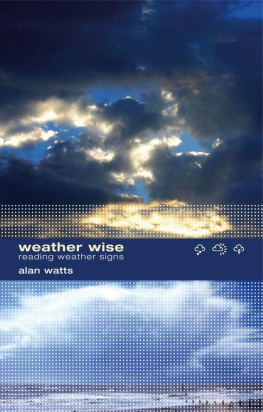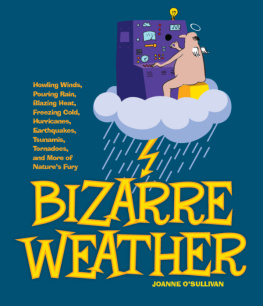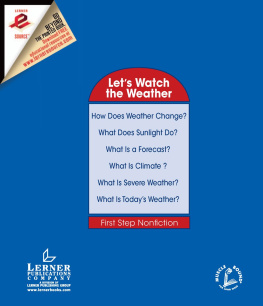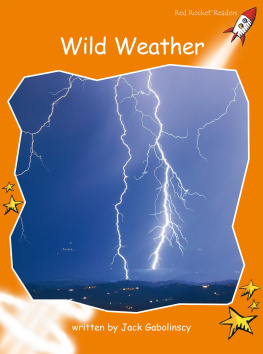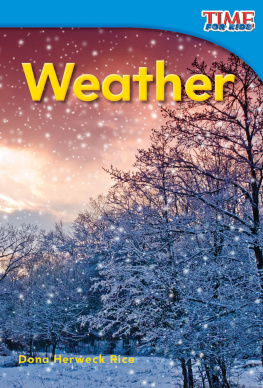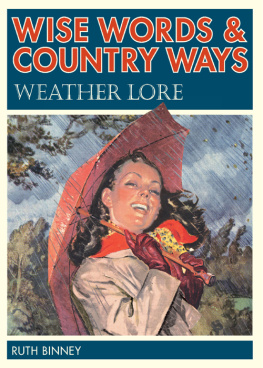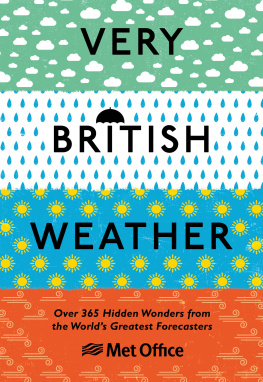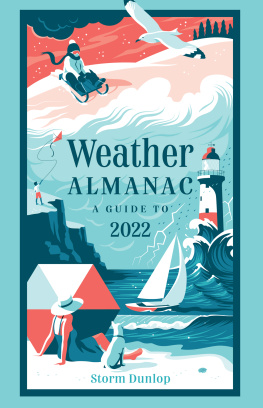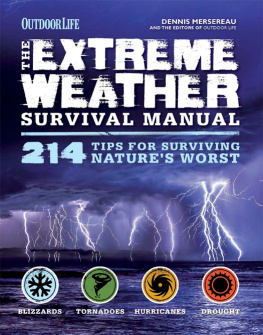Contents
About the Book
Rain before seven, fine by eleven
Red sky at night, shepherd's delight
Neer cast your clout before May is out
The first official BBC Weather book, celebrating the highs, lows, oddities and marvels of British weather.
About the Author
A multi-faceted and versatile writer, Alison Maloney is the author of several books, including The Mums Book, The World of Mr Selfridge and The Official Strictly Come Dancing Annual.
Foreword by Carol Kirkwood
There are very few subjects covered in broadcasting that affect us all, and that we all have an opinion about. How many times a day do you find yourself talking about the weather even just as a passing comment about how chilly it is? Will it be a hot summer? A white Christmas? I need rain for my garden! According to recent research, 94 per cent of British people admit to having discussed the weather in the past six hours, while 38 per cent say they have in the past 60 minutes. It certainly is a British obsession, and for many of us, BBC Weather is the place we go to for trusted forecasts and expert information.
My interest in weather started from a young age not in the sense that I wanted to be a Weather Presenter but rather that I grew up in the stunning northwest Highlands of Scotland in a village called Morar, where we could literally have four seasons of weather in one day! This would, of course, dramatically alter the look of the landscape but more importantly to me in my youth, curtail my outdoor plans! In those days, weather forecasts were nowhere near as accessible as they are now, and we would have to wait until after the main news bulletins, and it was so annoying if you missed it! Nowadays, you can have weather forecasting on demand, for a wide range of locations in the UK and around the world. Never in my wildest dreams did I ever think I would one day be presenting the weather forecast that I so relied on as a child, on the BBC.
The way we present the weather today is different from when I started as a rookie. In those days it was quite formal. Today it is still presented professionally, but in a much chattier style, and often it is placed within a programme rather than as a standalone item at the end of the news, allowing some interaction with other presenters in a studio. Aside from being more fun, it also gives us the chance to explain big weather stories in the UK and around the world, why things are happening, or simply to explain what a jetstream is and its influence on our weather, or where you are likely to see the Aurora Borealis!
But probably one of the main changes is our weather graphics. Remember CEEFAX? We used to have to input that data onto a computer it was so fiddly often East Anglia would end up as an island and it would be a nightmare trying to join it back onto the mainland again! In those days, when I joined the BBC Weather Centre back in the 1990s, our television graphics were still the sunshine and rain symbols (very 1970s!) not the magnetic ones I hasten to add, but the computer generated ones! We would drag and drop a symbol on the map, which was so big it would cover a whole area. So, for instance, the Midlands would show a rain symbol for the entire morning, even if the rain was just for the early part of the morning and only affecting the west Midlands. The graphics would only change when the presenter clicked to move the charts onto the afternoon forecast. Of course it was the job of the presenter to explain all that. Then in 2005 the BBC introduced 3D graphics which completely changed the way we told the weather story. We now had graphics that moved around the UK to cover all areas, a clock that showed the time advancing through the day and night, and also moving weather elements the cloud looked like cloud, and the rain like rain (albeit blue). This meant we could actually show what was happening where you were and what time you could expect the weather to change.
Now our graphics have changed once again, revolutionising the way we work. They look even more realistic and higher resolution data allow us to tell our audiences a more detailed story.
Of course one of the biggest changes over recent years has been the development of the BBCs digital weather services. Im proud to say that the BBC Weather app is one of the most popular of all the BBC apps and delivers a great experience for people on the move or wanting to know the weather instantly. Personalisation has also been a key development in our digital services, so our users can get the local weather for their own postcode. With our most recent re-launch we have refreshed our weather website and app with new functionality and detail.
New technology now helps me do my own job better too particularly when on location for BBC Breakfast. I used to have to rely on colleagues to brief me. Now I have access to much more online and can see and edit my charts from wherever I am in the UK.
I work with some of the brightest brains in meteorology. It is a pleasure to work with them all and discuss how we see the forecast evolving. We are always learning including from each other. Meteorology is not an exact science but it is a fun one to study. The weather always changes and bigger brains than mine are constantly finding new ways to make forecasts even more accurate. I enjoy looking at what the weather is going to be way ahead of what we broadcast. Just like our audiences, we are keen to know if it is going to be dry and warm for our outdoor parties too and we are as disappointed as anyone if the weather turns out to be different than expected! But there is very much a serious side to broadcasting a weather forecast. Sometimes knowing what is coming your way could even save your life and we work closely with the Met Office to ensure that any weather warnings are issued as quickly as possible.
Among the hundreds of weather broadcasts that I and my BBC colleagues do each day, one of the most treasured is the Shipping Forecast. Its a British institution in its own right these days loved for its poetry and rhythm as well as being of utmost importance to people at sea for work or pleasure. The Shipping Forecast is one of a range of marine weather forecasts that is owned by the Maritime and Coastguard Agency and we partner with them to ensure that these are made available to the public.
So you see, it is not just you who talks about the weather we do too! It is our passion and obsession.
I do hope you enjoy reading this book. You will learn there is a lot more to weather than you may have thought!
Carol

CHAPTER 1
The History of the Weather Forecast
The weather is nothing new. Since time began, man has battled wind, rain, hail and snow and basked in glorious sunshine. But the ability to predict the weather has become an essential part of modern life for everyone from farmers, pilots and sailors to families planning a weekend and organisers of social events. So where did it all start?
ANCIENT WEATHERMEN
Man has been trying to master the art of forecasting the weather since civilisation began. The ancient Babylonians, in around 650 BC , used the appearance of clouds and other changes in the sky such as haloes around the sun and moon to predict what was to come, while the Chinese, circa 300 BC , attempted long-term predictions, creating a solar calendar which divided the year into twenty-four festivals, each associated with a different weather pattern. They also used the behaviour of wildlife to predict short-term weather. A cricket chirping at night, for example, indicated a fine day to come.

